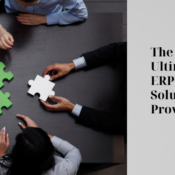Cloud ERP: Key Benefits and Advantages
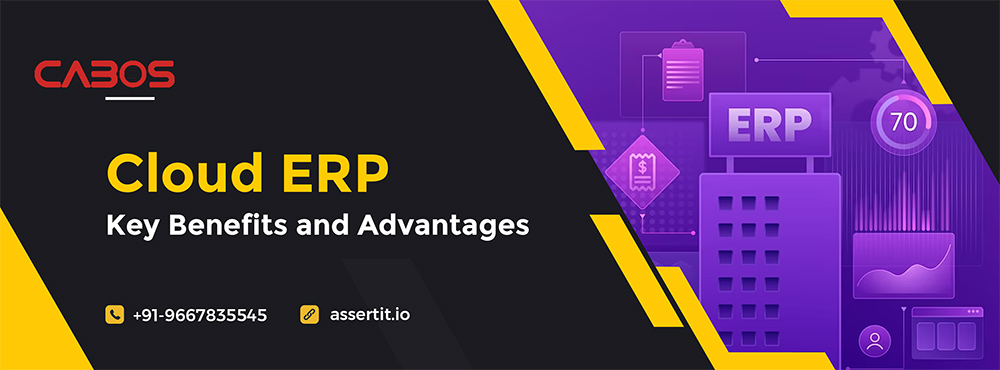
09/25/2023
/
Cloud ERP: Key Benefits and Advantages
Are you still using an outdated and expensive on-premise ERP system to run your business? If so, you are missing out on the many benefits and advantages of cloud ERP.
Cloud ERP software solutions are not just a software system, it is a business transformation strategy. Moving your ERP to the cloud lets you access your data and applications from anywhere, anytime, and on any device. You can also reduce your IT costs, improve your security and scalability, and enjoy the latest features and updates.
In this blog, we will show you what cloud ERP is, how it works, and why it is the smartest decision for your business.
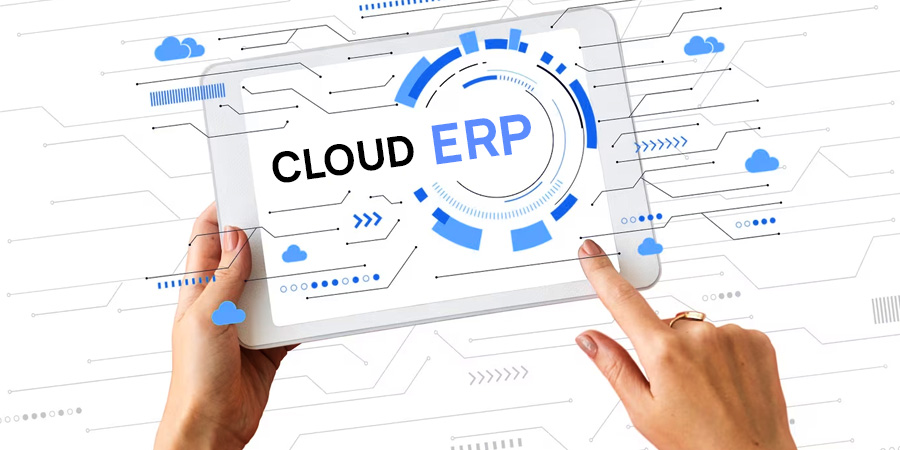 Cloud ERP is a software system that manages and automates all your business processes, from accounting to manufacturing, in the cloud. It connects and integrates all your data and applications in one place, giving you a single source of truth for your business. You can access your cloud ERP system from anywhere, anytime, and on any device, as long as you have an Internet connection.
Cloud ERP is a software system that manages and automates all your business processes, from accounting to manufacturing, in the cloud. It connects and integrates all your data and applications in one place, giving you a single source of truth for your business. You can access your cloud ERP system from anywhere, anytime, and on any device, as long as you have an Internet connection.

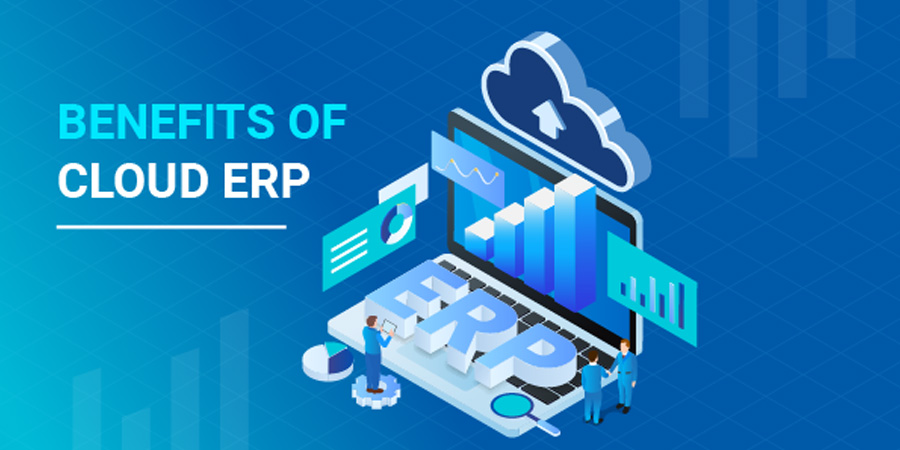 Cloud ERP offers many benefits over traditional on-premise ERP systems, such as:
Cloud ERP offers many benefits over traditional on-premise ERP systems, such as:
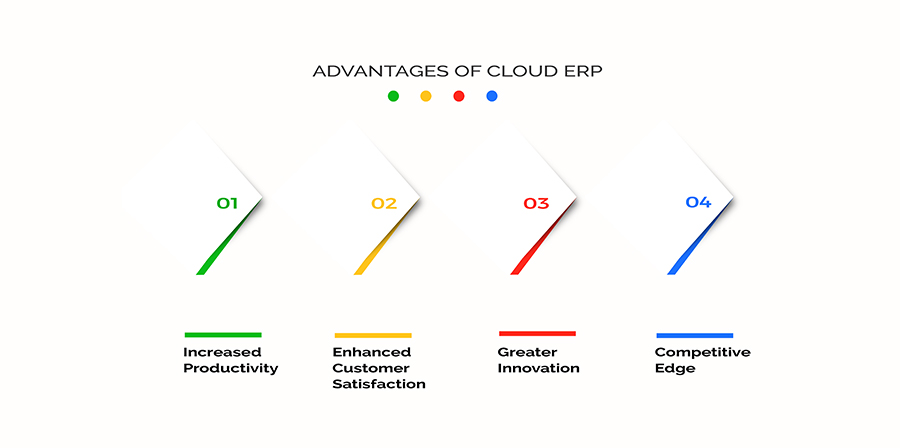 Cloud ERP not only provides benefits in terms of cost, speed, security, performance, flexibility, and availability but also in terms of strategic advantages for your business. Some of these advantages are:
Cloud ERP not only provides benefits in terms of cost, speed, security, performance, flexibility, and availability but also in terms of strategic advantages for your business. Some of these advantages are:
 There are different types of cloud ERP, depending on how they are deployed and hosted. Some of the common types are:
There are different types of cloud ERP, depending on how they are deployed and hosted. Some of the common types are:
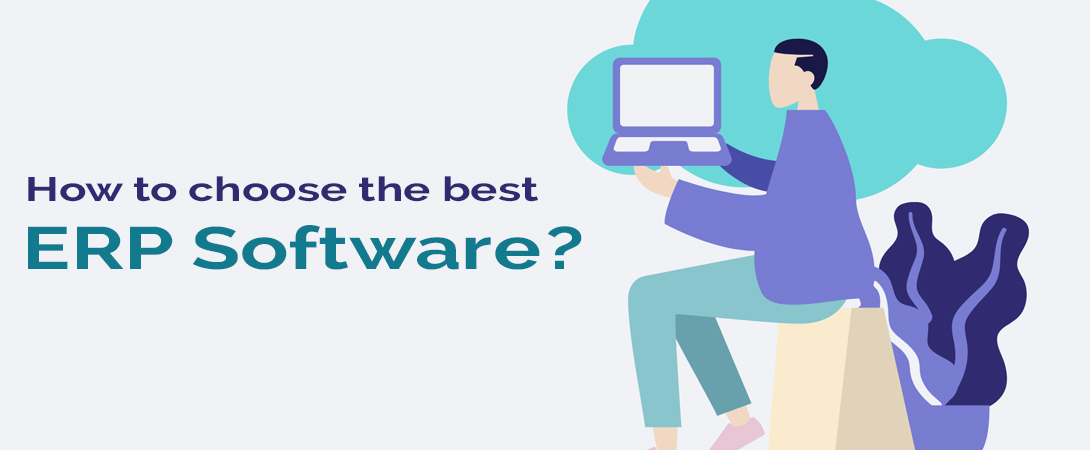 Choosing the best cloud ERP for your business depends on various factors, such as:
Choosing the best cloud ERP for your business depends on various factors, such as:
 When you're looking for a cloud ERP system, it's important to know about the costs and how to pick the right one without overspending. Let's make it simple:
When you're looking for a cloud ERP system, it's important to know about the costs and how to pick the right one without overspending. Let's make it simple:
What is cloud ERP?
 Cloud ERP is a software system that manages and automates all your business processes, from accounting to manufacturing, in the cloud. It connects and integrates all your data and applications in one place, giving you a single source of truth for your business. You can access your cloud ERP system from anywhere, anytime, and on any device, as long as you have an Internet connection.
Cloud ERP is a software system that manages and automates all your business processes, from accounting to manufacturing, in the cloud. It connects and integrates all your data and applications in one place, giving you a single source of truth for your business. You can access your cloud ERP system from anywhere, anytime, and on any device, as long as you have an Internet connection.
How does cloud ERP work?

- Cloud-Based Hosting: Cloud ERP software is hosted on remote servers by a service provider.
- Subscription Model: Users subscribe to the service, typically on a monthly or annual basis.
- Accessibility: Users can access the ERP system via the internet from anywhere with an internet connection.
- No Local Installation: There's no need to install or maintain the software on local servers or computers.
- Cost Savings: Eliminates the need for expensive hardware, software licenses, and IT staff.
- Security: The cloud ERP provider is responsible for data security, including updates and compliance.
- Automatic Updates: Providers handle software updates and upgrades, ensuring users have access to the latest features and security patches.
- Data Backups: Regular data backups are performed by the provider to prevent data loss.
- Remote Support: Users can receive remote support and troubleshooting from the provider.
What are the benefits of cloud ERP?
 Cloud ERP offers many benefits over traditional on-premise ERP systems, such as:
Cloud ERP offers many benefits over traditional on-premise ERP systems, such as:
- Lower total cost of ownership: Cloud ERP eliminates the need for upfront hardware investments, software licenses, and IT staff. You only pay for what you use.
- Faster implementation: Cloud ERP can be deployed in weeks or months, compared to years for on-premise ERP. You can also take advantage of pre-configured templates and best practices to speed up the process.
- Enhanced security: Cloud ERP providers use advanced encryption, firewalls, backup systems, and compliance standards to protect your data from unauthorized access or loss. You can also control who can access your data and what they can do with it.
- Improved performance: Cloud ERP systems run on powerful servers that can handle large volumes of data and transactions. You can also leverage artificial intelligence (AI), machine learning (ML), and analytics to gain insights and optimize your processes.
- Greater flexibility: Cloud ERP systems allow you to customize your solution according to your specific business requirements. You can also integrate with other cloud or on-premise applications using APIs or connectors.
- Higher availability: Cloud ERP systems have built-in disaster recovery capabilities that ensure your data and applications are always available, even in case of power outages or natural disasters.
What are the advantages of cloud ERP?
 Cloud ERP not only provides benefits in terms of cost, speed, security, performance, flexibility, and availability but also in terms of strategic advantages for your business. Some of these advantages are:
Cloud ERP not only provides benefits in terms of cost, speed, security, performance, flexibility, and availability but also in terms of strategic advantages for your business. Some of these advantages are:
- Increased productivity: Cloud ERP enables your employees to access their data and applications from anywhere, anytime, and on any device. This improves collaboration, communication, and efficiency across your organization.
- Enhanced customer satisfaction: Cloud ERP helps you deliver better products and services to your customers by streamlining your processes, improving your quality control, reducing errors, and increasing responsiveness.
- Greater innovation: Cloud ERP allows you to leverage new technologies such as AI, ML, IoT (Internet of Things), blockchain, etc., to create new products or services or improve existing ones. You can also experiment with new business models or markets without risking your core operations.
- Competitive edge: Cloud ERP gives you a competitive edge over your rivals by enabling you to adapt faster to changing customer demands, industry trends, or regulatory requirements. You can also gain insights from your data to identify new opportunities or threats.
What are the types of cloud ERP?
 There are different types of cloud ERP, depending on how they are deployed and hosted. Some of the common types are:
There are different types of cloud ERP, depending on how they are deployed and hosted. Some of the common types are:
- Public cloud ERP: This is when the cloud ERP provider hosts the software on its own servers and provides it to multiple customers over the Internet. The customers share the same software and infrastructure, but their data is isolated and secure. This is the most common and cost-effective type of cloud ERP.
- Private cloud ERP: This is when the cloud ERP provider hosts the software on its own servers and provides it to a single customer over the Internet. The customer has exclusive access to the software and infrastructure and can customize it to their needs. This is more expensive and less scalable than public cloud ERP, but it offers more control and security.
- Hybrid cloud ERP: This is when the cloud ERP provider hosts some of the software on its own servers and some of it on the customer’s servers. The customer can choose which modules or functions to run on the cloud or on-premise, depending on their preferences. This offers more flexibility and integration than public or private cloud ERP, but also more complexity and challenges.
How to choose the best cloud ERP software for your business?
 Choosing the best cloud ERP for your business depends on various factors, such as:
Choosing the best cloud ERP for your business depends on various factors, such as:
- Your business size, industry, and goals: You need to choose an ERP that can support your current and future business needs, as well as comply with your industry standards and regulations. You also need to consider your budget, timeline, and expected return on investment.
- Your functional requirements: You need to choose an ERP that can cover all your essential business functions, such as accounting, inventory, sales, manufacturing, etc. You also need to evaluate the features and capabilities of each function, such as reporting, analytics, automation, etc.
- Your technical requirements: You need to choose a cloud ERP that can integrate with your existing systems and applications, such as CRM, e-commerce, HRM, etc. You also need to assess the security, reliability, performance, and scalability of the cloud ERP system.
- Your vendor selection: You need to choose a cloud ERP vendor with a proven track record, a strong reputation, and a clear vision. You also need to check the vendor’s customer service, support, training, and pricing options.
Understanding Cloud ERP Costs and Choosing Wisely for Your Budget
 When you're looking for a cloud ERP system, it's important to know about the costs and how to pick the right one without overspending. Let's make it simple:
When you're looking for a cloud ERP system, it's important to know about the costs and how to pick the right one without overspending. Let's make it simple:
- Licensing: Pay attention to user-based subscription fees and the number of users you need.
- Implementation: Budget for setup and data migration services.
- Customization and Integration: Consider costs for tailoring the ERP and integrating it with other systems.
- Training and Support: Include training and support expenses.
- Infrastructure: Account for cloud infrastructure and bandwidth needs.
- Scalability: Understand how costs change as your business grows.
- Hidden Costs: Watch out for unexpected fees.
- Total Cost of Ownership (TCO): Calculate long-term costs.
- Vendor Comparison: Get quotes from multiple vendors, considering reputation and support.
- ROI: Assess the benefits and potential return on investment.
Conclusion:
Selecting the right cloud ERP software solutions, like Logway ERP, for your business is crucial but not always straightforward. You need to consider your business needs, what the software can do, which company to choose, and how much it will cost. To make an informed decision, you should do your research, try out different options, ask for advice from others who have used ERP software solutions, and discuss the contract with the company. If you need assistance with this process, don't hesitate to contact Logway now. We specialize in cloud ERP software solutions and can guide you through the entire process.Recent Posts
Monika Narriya/0 Comments
Why are ERP solutions important in the education sector?
Monika Narriya/0 Comments
Which is the best ERP solution provider company?
Monika Narriya/0 Comments
How do we select the right ERP solution for our businesses?
Sumit Kumar/0 Comments
9 Most In-Demand Programming Languages for 2024
Sumit Kumar/0 Comments
Best Time to Post on Social Media – 2024 Guide
Sumit Kumar/0 Comments
Why You Should Consider Semantic HTML for SEO
All Categories
- Bing
- Blockchain
- Blog
- Branding
- Case Study
- Content Marketing
- Conversion Rate Optimization
- Cryptocurrency
- Digital Currency
- Digital Marketing
- Email Marketing
- ERP Solutions
- Facebook Marketing
- Google Ads
- Google Updates
- Graphic Designing
- Hire Developers
- Image SEO
- Influencer Marketing
- IT
- Local SEO
- Machine Learning
- Mobile Application Development
- Pay Per Click
- Pinterest SEO
- Podcast Hosting
- React JS
- Reddit & Quora
- Search Engine Optimization
- SEO Copywriting
- Social Media Marketing
- Software
- Software Development
- Technology
- UX and UI
- Web Designs
- Web Hosting
- Website Development
- Website Redesigning
- YouTube SEO




